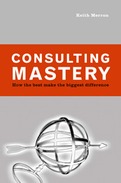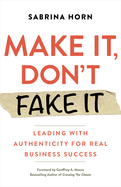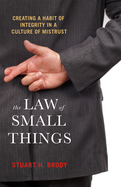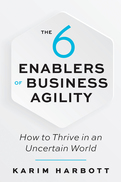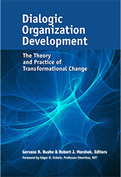Search Results: "building the future"
Results 481-486 of 1218
Consulting Mastery
2005
Most consultants are content to solve problems. Extraordinary consultants alter the culture of the client organization itself, changing the way the organization operates. Keith Merron shows that the most powerful tool for making a real difference is the consultant's inner stance--the attitudes, assumptions, beliefs, goals, and strategies that underlie the consulting practice. In other words, it is the inner qualities of the consultant that differentiate a great consultant from the rest of the pack.
Consulting Mastery explores the deep inner shift required to become an extraordinary consultant. Through vivid examples, Merron contrasts the goals, strategies, and tactics used by most consultants with those used by masterful consultants to reveal the qualities and characteristics that will help you make the biggest difference with your clients.
If you yearn to have a bigger impact on your client organizations, or even on the world as a whole, Consulting Mastery shows how to transform yourself from a problem solver to an empowering partner. Following a natural flow of learning, it details the conceptual foundation of consulting mastery, provides a vision of mastery in action, and outlines a clear path to attaining mastery in oneself.Most consultants are content to solve problems. Extraordinary consultants alter the culture of the client organization itself, changing the way the organization operates. Keith Merron shows that the most powerful tool for making a real difference is the consultant's inner stance--the attitudes, assumptions, beliefs, goals, and strategies that underlie the consulting practice. In other words, it is the inner qualities of the consultant that differentiate a great consultant from the rest of the pack.
Consulting Mastery explores the deep inner shift required to become an extraordinary consultant. Through vivid examples, Merron contrasts the goals, strategies, and tactics used by most consultants with those used by masterful consultants to reveal the qualities and characteristics that will help you make the biggest difference with your clients.
If you yearn to have a bigger impact on your client organizations, or even on the world as a whole, Consulting Mastery shows how to transform yourself from a problem solver to an empowering partner. Following a natural flow of learning, it details the conceptual foundation of consulting mastery, provides a vision of mastery in action, and outlines a clear path to attaining mastery in oneself.
- Shows consultants how to go beyond simply solving clients' problems to creating fundamental and lasting organizational change
- Draws on interviews with 14 master consultants to explore what distinguishes masterful consulting from ordinary consulting
- Takes the reader on a five-stage journey to becoming a master consultant
An award-winning CEO and communications expert shows how authentic leadership eliminates the need for the shortcuts that sabotage success. “Fake it till you make it” just doesn't work—at least not long enough to build a sustainable business.
Driven to succeed under constant pressure, entrepreneurs and business leaders alike can be tempted to exaggerate their strengths, minimize weaknesses, and bend the truth. Through the twin lenses of running her own national public relations firm and advising thousands of executives for a quarter-century, Sabrina Horn revisits the core of leadership; defines authentic, reality-based business integrity; and shows readers how to attain and maintain it.
With firsthand accounts of sticky situations and painful mistakes, Horn lays out workable strategies, frameworks, and mental maps to help leaders gain the clarity of thought necessary to make sound business decisions, even when there are no right answers. In her straightforward, no-nonsense style, she shares the power of humility and empathy, mentorship and self-assessment, and a strong core value system to build a leader's confidence and resilience. Horn's fake-free advice will empower readers to disarm fear, organize risk, manage setbacks and crises, deal with losing and loneliness, and create a culture and brand designed for long-term success.
Driven to succeed under constant pressure, entrepreneurs and business leaders alike can be tempted to exaggerate their strengths, minimize weaknesses, and bend the truth. Through the twin lenses of running her own national public relations firm and advising thousands of executives for a quarter-century, Sabrina Horn revisits the core of leadership; defines authentic, reality-based business integrity; and shows readers how to attain and maintain it.
With firsthand accounts of sticky situations and painful mistakes, Horn lays out workable strategies, frameworks, and mental maps to help leaders gain the clarity of thought necessary to make sound business decisions, even when there are no right answers. In her straightforward, no-nonsense style, she shares the power of humility and empathy, mentorship and self-assessment, and a strong core value system to build a leader's confidence and resilience. Horn's fake-free advice will empower readers to disarm fear, organize risk, manage setbacks and crises, deal with losing and loneliness, and create a culture and brand designed for long-term success.
Privatization has been on the right-wing agenda for years, but now it has the power of the Bush administration behind it. Health care, schools, Social Security, public lands, the military, prisons--all are considered fair game. But does privatization really serve the public good? Or is it a payoff to powerful corporations intent on replacing the government with a Òprivate profit culture,Ó in which there is no meaningful public accountability and the bottom line rules all? In this powerful book, legendary activist Si Kahn and public philosopher Elizabeth Minnich argue that privatization is a threat whose seriousness few appreciate.
Kahn and Minnich expose the damage privatization has done in several specific areas of society, as well as to society as a whole. They argue that corporations are, by their very nature, unable to effectively fulfill what have traditionally been the responsibilities of government. Some things that are worth doing simply canÕt, indeed shouldnÕt, be done purely for profit. Unless there is a balance between the public and private sectors, vulnerable populations will be chronically underserved and critical public functions will be under-funded to the point of virtual elimination.
Privatization is usually dealt with in dry economic terms, but Kahn and Minnich take an unusual and lively approach to the issue. Combining stories, analysis, impassioned argument, and even song lyrics, they discuss how the concept of privatization has evolved and look at the different forces that work for and against it, emphasizing the extreme anti-government ideology motivating many privatization advocates. And they outline principles and practices for combating privatization and its proponents.
The Fox in the Henhouse makes a powerful case that the market is not the measure of all things, and that a vital public sector is an indispensable component of a healthy democracy.Privatization has been on the right-wing agenda for years, but now it has the power of the Bush administration behind it. Health care, schools, Social Security, public lands, the military, prisons--all are considered fair game. But does privatization really serve the public good? Or is it a payoff to powerful corporations intent on replacing the government with a Òprivate profit culture,Ó in which there is no meaningful public accountability and the bottom line rules all? In this powerful book, legendary activist Si Kahn and public philosopher Elizabeth Minnich argue that privatization is a threat whose seriousness few appreciate.
Kahn and Minnich expose the damage privatization has done in several specific areas of society, as well as to society as a whole. They argue that corporations are, by their very nature, unable to effectively fulfill what have traditionally been the responsibilities of government. Some things that are worth doing simply canÕt, indeed shouldnÕt, be done purely for profit. Unless there is a balance between the public and private sectors, vulnerable populations will be chronically underserved and critical public functions will be under-funded to the point of virtual elimination.
Privatization is usually dealt with in dry economic terms, but Kahn and Minnich take an unusual and lively approach to the issue. Combining stories, analysis, impassioned argument, and even song lyrics, they discuss how the concept of privatization has evolved and look at the different forces that work for and against it, emphasizing the extreme anti-government ideology motivating many privatization advocates. And they outline principles and practices for combating privatization and its proponents.
The Fox in the Henhouse makes a powerful case that the market is not the measure of all things, and that a vital public sector is an indispensable component of a healthy democracy.
- Read a transcript of Amy Goodman's interview with Si and Elizabeth on Democracy Now!
- A legendary activist and a distinguished public philosopher address a timely but complex issue in a way that is accessible and compelling
- Evaluates privatization not just economically, but in social, political, and human terms
- Offers principles and practices for creating alternatives to privatization and strengthening the public sector
We are living in a time when dishonesty and duplicity are common in our public institutions, our workplaces, and even in our personal relationships. But by recognizing and resisting the small, seemingly inconsequential ways we make moral compromises in our own lives, we can repair the tear in our social and moral fabric.
The Law of Small Things begins with an IQ (Integrity Quotient) test designed to reveal the casual way we regard our promises and the misconceptions we have about acting truthfully. The book shows how most people believe that integrity is something we “just have” and that we just do, like a Nike commercial. It depicts these and other deceptions we deploy to appear to act with integrity without actually doing so.
The Law of Small Things also exposes how our culture encourages breaches of integrity through an array of “permitted promise-breaking,” a language of clichés that equates self-interest with duty, and the “illusion of inconsequence” that excuses small breaches with the breezy confidence that we can fulfill integrity when it counts.
Brody challenges the prevailing notion that integrity is a possession you hold permanently. No one “has integrity” and no one is perfect in practicing it. What we have is the opportunity to uphold promises and fulfill duties in each situation that faces us, large and small. Integrity is a practice and a habit of keeping promises, the ones we make explicitly and the ones that are implied in all our relationships.
Ultimately, developing skill in the practice of integrity leads us to knowledge of who we are--not in the way the culture defines us, but in the way we truly know ourselves to be.
The Law of Small Things begins with an IQ (Integrity Quotient) test designed to reveal the casual way we regard our promises and the misconceptions we have about acting truthfully. The book shows how most people believe that integrity is something we “just have” and that we just do, like a Nike commercial. It depicts these and other deceptions we deploy to appear to act with integrity without actually doing so.
The Law of Small Things also exposes how our culture encourages breaches of integrity through an array of “permitted promise-breaking,” a language of clichés that equates self-interest with duty, and the “illusion of inconsequence” that excuses small breaches with the breezy confidence that we can fulfill integrity when it counts.
Brody challenges the prevailing notion that integrity is a possession you hold permanently. No one “has integrity” and no one is perfect in practicing it. What we have is the opportunity to uphold promises and fulfill duties in each situation that faces us, large and small. Integrity is a practice and a habit of keeping promises, the ones we make explicitly and the ones that are implied in all our relationships.
Ultimately, developing skill in the practice of integrity leads us to knowledge of who we are--not in the way the culture defines us, but in the way we truly know ourselves to be.
Adopting the latest agile tools and practices won't be enough to respond to rapid market change. Leaders must first lay the groundwork by creating the right environment for these tools to work.
Many managers struggle to install the underlying organizational operating system for business agility. High-performing agile organizations depend on the strength of six key enabling factors: leadership, culture, structure, people, governance, and ways of working. This book explains why these factors are important and how they work together to increase organizational agility. Real-world examples, stories, and tools will help leaders get realistic about the scope of changes needed in their organizations and show them how to get started.
Karim Harbott does not offer a book of recipes. Instead, he focuses on mindset, principles, and general patterns. This book summarizes of the most important factors in increasing organizational agility and why they work, which leaders will need to consider in a so-called agile transformation. Because every organization is different, each will have its own route to agility and high performance. Managers will need to tackle all the areas that are crucial to creating an environment in which any chosen approach can work.
Many managers struggle to install the underlying organizational operating system for business agility. High-performing agile organizations depend on the strength of six key enabling factors: leadership, culture, structure, people, governance, and ways of working. This book explains why these factors are important and how they work together to increase organizational agility. Real-world examples, stories, and tools will help leaders get realistic about the scope of changes needed in their organizations and show them how to get started.
Karim Harbott does not offer a book of recipes. Instead, he focuses on mindset, principles, and general patterns. This book summarizes of the most important factors in increasing organizational agility and why they work, which leaders will need to consider in a so-called agile transformation. Because every organization is different, each will have its own route to agility and high performance. Managers will need to tackle all the areas that are crucial to creating an environment in which any chosen approach can work.
A Dynamic New Approach to Organizational Change
Dialogic Organization Development is a compelling alternative to the classical action research approach to planned change. Organizations are seen as fluid, socially constructed realities that are continuously created through conversations and images. Leaders and consultants can help foster change by encouraging disruptions to taken-for-granted ways of thinking and acting and the use of generative images to stimulate new organizational conversations and narratives. This book offers the first comprehensive introduction to Dialogic Organization Development with chapters by a global team of leading scholar-practitioners addressing both theoretical foundations and specific practices.
Dialogic Organization Development is a compelling alternative to the classical action research approach to planned change. Organizations are seen as fluid, socially constructed realities that are continuously created through conversations and images. Leaders and consultants can help foster change by encouraging disruptions to taken-for-granted ways of thinking and acting and the use of generative images to stimulate new organizational conversations and narratives. This book offers the first comprehensive introduction to Dialogic Organization Development with chapters by a global team of leading scholar-practitioners addressing both theoretical foundations and specific practices.


